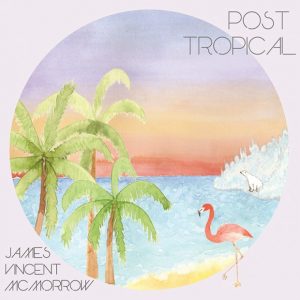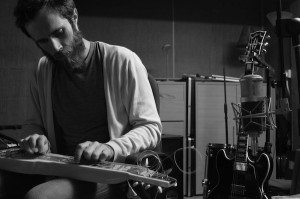
 Irish singer-songwriter James Vincent McMorrow's sophomore record "Post Tropical" is a prime example of why musicians should keep listeners interested by letting their sound evolve. His debut was a folksy, guitar-oriented affair that was influenced by the indie rock music at the time such as Bon Iver, The Avett Brothers, and Edward Sharpe & the Magnetic Zeroes. These bands saw a massive spike in popularity after Mumford & Sons released their "Sigh No More" record in 2009. At that moment, the "Mumford" sound took over rock and alternative radio; bands like Imagine Dragons and Of Monsters and Men dominated the charts. McMorrow's melodies were sweet and his voice was tender but alas, he was simply borrowing from a sonic formula that was already proven to work. He was in a sense jumping on the Mumford & Sons bandwagon even though his lyrics and melodic sense were far more sophisticated than typical folk rock.
Irish singer-songwriter James Vincent McMorrow's sophomore record "Post Tropical" is a prime example of why musicians should keep listeners interested by letting their sound evolve. His debut was a folksy, guitar-oriented affair that was influenced by the indie rock music at the time such as Bon Iver, The Avett Brothers, and Edward Sharpe & the Magnetic Zeroes. These bands saw a massive spike in popularity after Mumford & Sons released their "Sigh No More" record in 2009. At that moment, the "Mumford" sound took over rock and alternative radio; bands like Imagine Dragons and Of Monsters and Men dominated the charts. McMorrow's melodies were sweet and his voice was tender but alas, he was simply borrowing from a sonic formula that was already proven to work. He was in a sense jumping on the Mumford & Sons bandwagon even though his lyrics and melodic sense were far more sophisticated than typical folk rock.
Now, after four years of trudging along that path, McMorrow has released himself from the shackles of the banality of the overused folk sound in today's rock music. His shift in direction is characterized by copious amounts of hip hop beats, resonating vocal harmonies, electronic instruments, and 60s soul phrasing. The similarities between McMorrow and his folk roots still exist, but the augmentation of his sound has obscured the assumption that he's simply a Bon Iver clone.
"Post Tropical" succeeds in making complex themes easy to digest by delivering them in a mellow, calming package. Songs like "Cavalier", which deals with wanting to forget past loves, and "Red Dust", a song about needing a significant other to make life tolerable, are lyrically arduous yet so accessible. He sings with such a heavy heart but is simultaneously full of hope. A paradoxical approach, surely, this sound is the overarching theme of the record and is in part due to McMorrow's ethereal falsetto. His falsetto can be considered the main instrument throughout the album; it has the ability to be light, resting atop the chords in a whisper, or heavy, penetrating the arrangement in a cluster of harmonies. His singing technique is impressive but never reaches the point of being ostentatious.
 Another dominating presence on the album is the Roland TR-808, a drum machine first introduced in 1980. It has been used in music by The Beastie Boys and Marvin Gaye; it now serves as the primary rhythm section on "Post Tropical". Its simple programmed beats can be clearly identified on songs like "The Lakes", "Red Dust" and "All Points". Speaking of "All Points", its incredible hook -- "I was (I was) / In the dark / I was (I was)" -- signals the influence of 60s soul music, specifically the utilization of call-and-response vocal arrangements from that era. However, the tone is vastly different from the "wall of sound" production that can be heard on Phil Spector-produced soul records by the Ronettes and the like. The reverb is still present but the arrangement is much more sparse; it feels isolated, like being inside someone's mind with access to their thoughts. This desolate atmosphere is the final piece of the tapestry, the thing that gives the album its distinctive sound. Other electronic instrumentation fleshes out the intimate arrangements in strategic places (usually to make certain section more grand and dramatic). Synth bass and artificial horns cut through the mix in "Look Out" and "Cavalier" as soon as McMorrow's voice begins to grow in volume. Although he now embraces electronic textures, his fondness for acoustic instrumentation remains unscathed. The acoustic guitar arpeggiation at the head of "Repeating" and the piano featured throughout "Glacier" prove that timbres from any phonic origin can combine to great effect.
Another dominating presence on the album is the Roland TR-808, a drum machine first introduced in 1980. It has been used in music by The Beastie Boys and Marvin Gaye; it now serves as the primary rhythm section on "Post Tropical". Its simple programmed beats can be clearly identified on songs like "The Lakes", "Red Dust" and "All Points". Speaking of "All Points", its incredible hook -- "I was (I was) / In the dark / I was (I was)" -- signals the influence of 60s soul music, specifically the utilization of call-and-response vocal arrangements from that era. However, the tone is vastly different from the "wall of sound" production that can be heard on Phil Spector-produced soul records by the Ronettes and the like. The reverb is still present but the arrangement is much more sparse; it feels isolated, like being inside someone's mind with access to their thoughts. This desolate atmosphere is the final piece of the tapestry, the thing that gives the album its distinctive sound. Other electronic instrumentation fleshes out the intimate arrangements in strategic places (usually to make certain section more grand and dramatic). Synth bass and artificial horns cut through the mix in "Look Out" and "Cavalier" as soon as McMorrow's voice begins to grow in volume. Although he now embraces electronic textures, his fondness for acoustic instrumentation remains unscathed. The acoustic guitar arpeggiation at the head of "Repeating" and the piano featured throughout "Glacier" prove that timbres from any phonic origin can combine to great effect.
McMorrow has stated that this eclectic use of acoustic and electronic tones was inspired by the environment where the record was cut: Torneo, Texas. Said he, "I think it's kind of engrained in the record, more than any pinpointed thing. I can hear the hot bedded air in this part. You can hear the birds in the pianos." Thus, inspiration from nature is an audible component on the album. I may not, for example, hear birds in the pianos like McMorrow, but I do hear the same kind of majesty of nature from the start of the record to the finale. This is an album that demands to be heard, in the same way that a beautiful mountain or lake demands to be seen.
[youtube]https://www.youtube.com/watch?v=j0DvjgagJko[/youtube]
For James Vincent McMorrow upcoming tour information: [LinkButton]https://jamesvmcmorrow.com/tourdates[/LinkButton]